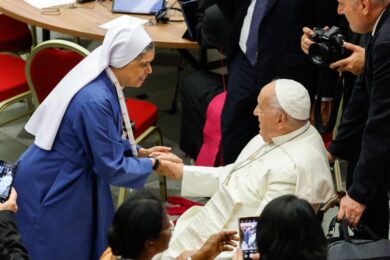October 2, 2024
No one has ‘exclusive right’ to God’s voice, pope says at synod opening
WORLD
By Justin McLellan, Catholic News Service

Pope Francis greets a religious woman before the start of the opening working session of the Synod of Bishops in the Vatican’s Paul VI Audience Hall Oct. 2, 2024. (CNS photo/Lola Gomez)
VATICAN CITY (CNS) — Members of the Synod of Bishops must engage in genuine dialogue with those holding differing views, avoid pushing personal agendas and remain open to changing their minds about what is best for the church, Pope Francis said.
“We must free ourselves from everything that prevents the charity of the Spirit from creating harmony in diversity in us and among us,” he said in his homily at the synod’s opening Mass. “Those who arrogantly claim to have the exclusive right to hear the voice of the Lord cannot hear it.”
The pope was joined by the 368 members of the Synod of Bishops for the Mass in St. Peter’s Square Oct. 2. The synod’s 16 fraternal delegates — representatives from other Christian communities, who are participating in the assembly without voting privileges — were the first to process into the square, followed by laypeople and religious who make up the 96 non-bishop voting members of the synod, or just over a quarter of the assembly. The Vatican reported that 77 cardinals attended the Mass.
Pope Francis urged synod participants to be careful “not to see our contributions as points to defend at all costs or agendas to be imposed,” but rather to see their personal contribution to the synod proceedings “as a gift to be shared, ready even to sacrifice our own point of view in order to give life to something new, all according to God’s plan.”
Otherwise, he warned, “we will end up locking ourselves into dialogues among the deaf, where participants seek to advance their own causes or agendas without listening to others and, above all, without listening to the voice of the Lord.”
The 87-year-old pope presided over the Mass but remained seated throughout the liturgy. Cardinal Jean-Claude Hollerich, relator general of the synod, was the main celebrant at the altar, joined by Cardinal Mario Grech, secretary-general of the synod, and Bishop Luis Marín de San Martín, undersecretary of the synod.
The day after Israeli troops crossed the border into Lebanon and Iran fired ballistic missiles at Israel — seen as significant escalations of the conflict in the Middle East — Pope Francis in his homily called on all people to observe a day of prayer and fasting for peace Oct. 7, marking one year since Hamas’ attack on Israel that sparked the ongoing conflict.
The pope also announced he will lead the recitation of the rosary for peace at Rome’s Basilica of St. Mary Major Oct. 6, and he invited synod members to join him.
“Brothers and sisters, we again take up this synodal journey with a gaze fixed on the world, because the Christian community is always at the service of humanity to announce to all the joy of the Gospel,” he said. “It is needed above all in this dramatic hour of history when the winds of war and flames of violence continue to destroy entire peoples and nations.”
In his homily, Pope Francis said that the synod is not a “parliamentary assembly,” but an effort to understand the history, dreams and hopes of “our brothers and sisters scattered around the world inspired by our same faith, moved by the same desire for holiness.”
He called on synod members to receive the contributions of the people of God collected throughout the synodal process, which began in October 2021, “with respect and attention, in prayer and in the light of the Word of God” in order to “reach the destination the Lord desires for us.”
“The more we realize that we are surrounded by friends who love, respect and appreciate us, friends who want to listen to what we have to say, the more we will feel free to express ourselves spontaneously and openly,” the pope said.
Developing such an attitude, he said, is not just a “technique” for facilitating dialogue and group communication dynamics, but is central to the church’s vocation as “a welcoming place of gathering.”
Though he acknowledged the need to be “great” in spirit, heart and outlook “because the issues that we must deal with are great and delicate, and the situations are broad and universal,” the pope also said that “the only way to be worthy of the task entrusted to us is to make ourselves small and to receive one another humbly.”
“Let us walk together, let us listen to the Lord, let us be led by the blowing of the Spirit,” he said.


 Facebook
Facebook Youtube
Youtube
